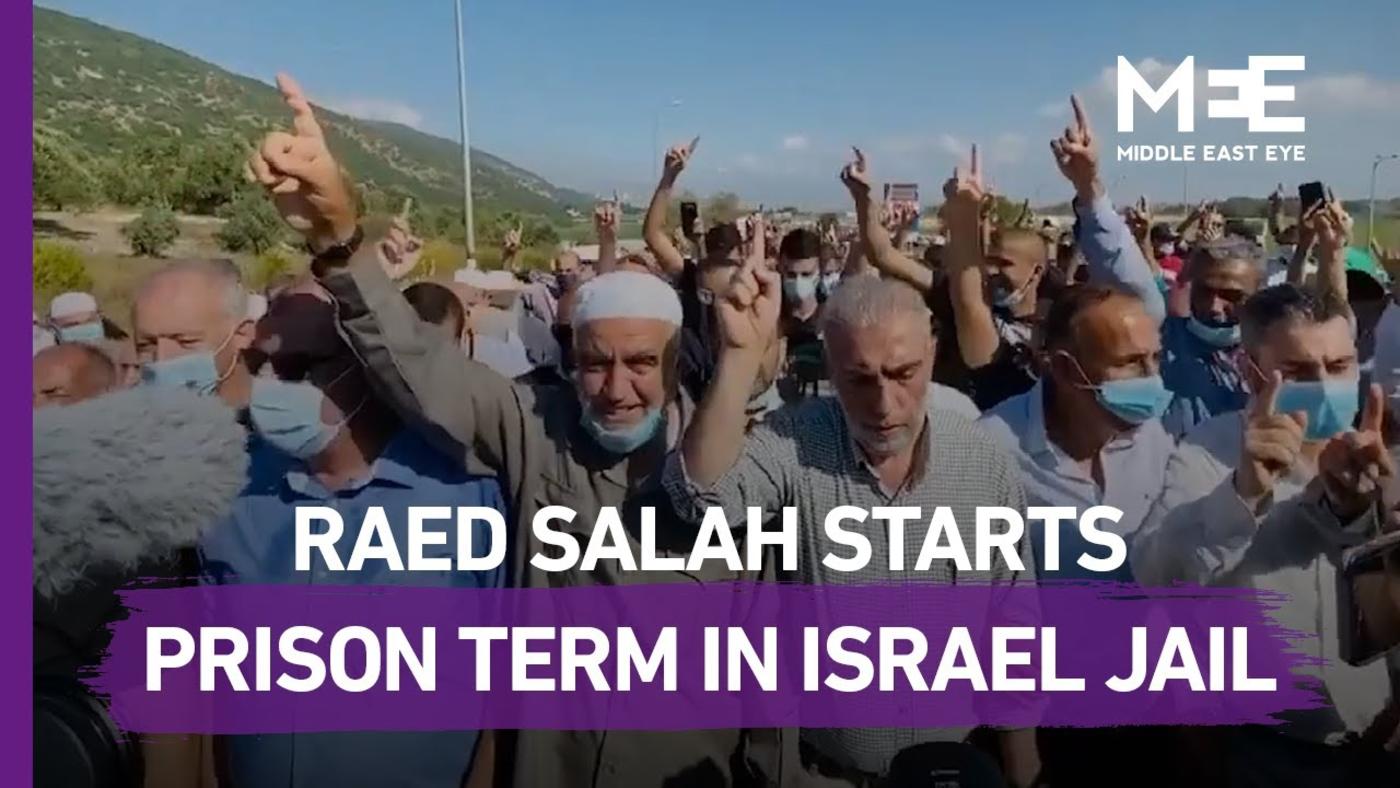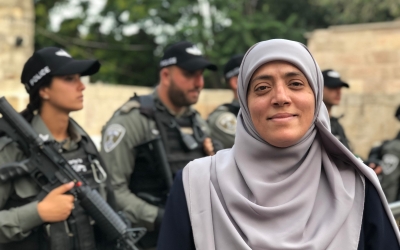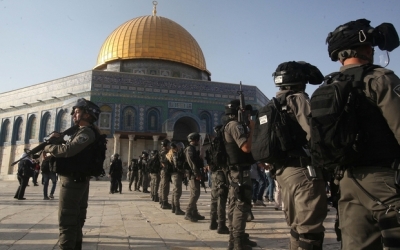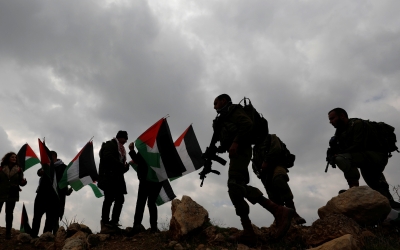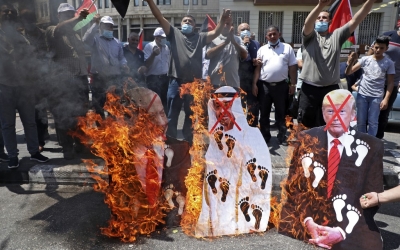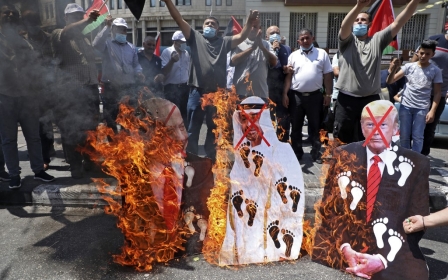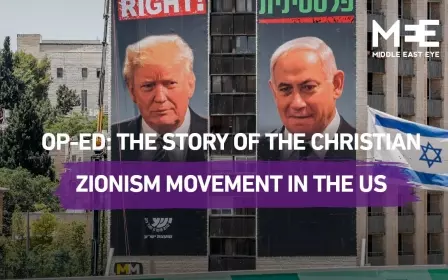Sheikh Raed Salah: 'I head to prison standing by my values'
Sheikh Raed Salah, one of the most prominent Palestinian religious and political figures, has spent his entire career in and out of Israeli prisons. On Sunday, he began his seventh period of imprisonment.
After having lost an appeal in July, Salah is set to serve a 28-month sentence in Israeli custody over charges of “inciting terror”. The sentence includes an 11-month suspended sentence for time served.
The case has been based on speeches Salah made during protests in July 2017 against the installation of metal detectors at the outer gates of the Al-Aqsa Mosque compound in occupied East Jerusalem.
In his speech, the native of Umm al-Fahm, a Palestinian-majority village in Israel, quoted verses from the Quran and the hadiths - a collection of the sayings of Prophet Muhammad - as well as Palestinian folklore. He maintains that his words were willfully miscontrued in order to lock him up.
Known for his defence of the Al-Aqsa Mosque compound and Palestinian rights, Salah was the leader of the northern branch of the Islamic Movement until it was banned by Israel in 2015.
Salah, however, is a voice that refuses to be silenced.
At one point in Israel’s vendetta against the Islamist leader, security forces thought they had killed him. Salah was on the infamous Turkish ship Mavi Marmara, part of a flotilla sailing towards Gaza in 2010 to break the Israeli-led siege, when it was boarded by Israeli naval commandos.
Initial reports claimed a man very similar to Salah was injured by a gunshot wound to the head. In a statement to a court in Ashkelon in 2010, Salah said soldiers shot at someone with a similar appearance, thinking that the man was him. “They shot him, but I was their target,” he said at the time.
A year later, while on a speaking tour to Britain, Salah was arrested following an order by the UK’s then-home secretary, Theresa May. Salah appealed against the ban and deportation order, winning the case 10 months later.
His current prison sentence comes right on the heels of three years under house arrest. Since 2017, Salah has been forbidden from using social media or speaking to journalists.
But just before presenting himself to the prison authories, wearing an ankle monitor, Salah spoke with Middle East Eye, reiterating that he would rather be in prison than give up on the Palestinian cause.
Here is a transcript of the interview, edited for clarity.
How have you prepared for your time in prison and how do you plan to spend your time there?
I am not exaggerating when I say that time is tight in prison, because I set a schedule for myself that starts from the dawn prayer until bedtime.
I do not waste a moment of my time, so I either spend it reading - including the Holy Quran - or writing, composing poetry and certainly praying.
I plan to bring a sketchbook in with me. I plan to draw a picture everyday while I’m in my cell - it might be a very important language for victory.
I go to prison in complete contentedness, joy and assurance; standing by my values, regretting nothing. I know that as soon as I enter prison, they will start working to build a new case against me and launch a new round of investigations.
How many times have you been imprisoned?
I was imprisoned six times for periods ranging from six months to two-and-a-half years. This isn’t including the numerous arrests and days-long interrogations after which I was released - those cannot be counted.
'I go to prison in complete contentedness, joy and assurance; standing by my values, regretting nothing'
I have also been subject to home arrest for three years, under very suffocating conditions. For example, I was only allowed to leave the house at specific hours, and I had to be accompanied by a sponsor; no relatives - whether first or second degree - were allowed to visit me, and I was banned from communicating with any media.
In the event that I had to see a doctor, or perform a sermon of mourning or joy for a relative, I had to seek permission from the court in advance.
What was particularly suffocating was being monitored at all times through an electronic device fixed around my ankle, which was examined by specialists from time to time.
Can you talk about your most recent case and the charges brought against you?
I was presented with a charge sheet in August 2017 that included "incitement to violence" based on speeches I gave and articles I wrote during the period of the uprising in Jerusalem against metal detectors installed at the entrance to the Al-Aqsa Mosque compound that year.
For the first time, a set of values are criminalised in the same case, including verses from the Quran and hadiths from the Prophet’s Sunnah, in addition to criminalising Palestinian folklore and imposing inacurrate interpretations of the Arabic language.
In the course of the court sessions, many examples emerged. For example, they criminalised the Quranic verse: “Do not think of those slain for the cause of God as dead. They are alive with their Lord and receive sustenance from Him.”
The Israeli judiciary considered my use of this verse a call for incitement, violence and terrorism. They also criminalised the hadiths of the Prophet that talk about defending the holy sites (ribat in Arabic), even though I made it clear to them that ribat is worship through which a Muslim resides in mosques permanently for the purpose of prayer, supplication and learning of religion, and that ribat can take place in any mosque on earth and is not limited to the Al-Aqsa Mosque.
Dozens of errors were committed by the public prosecution and its witnesses in their explanations of parts of the Quran, Sunnah and the Arabic language, and the judge deliberately ignored them.
What do you think of the judicial process with your most recent case - and the legitimacy of the Israeli judiciary?
The court’s decision was agreed upon in advance before my conviction. The issue of my rearrest, interrogation and the successive court sessions were only formal procedures to mask the process with a cloak of judicial legitimacy. The team of lawyers who are defending my case also believe that.
The judge who tried me in court had no idea about the Holy Quran, the Sunnah of the Prophet, the Arabic language and Palestinian folklore. I wondered, how did he come to this ruling? What are his qualifications? They brought experts to look into my case and they made huge errors in the Arabic language and tried to distort many of my words to convict me.
The scene (in court) was ridiculous - sometimes the court attendees were laughing at mistakes that the experts had made in trying to make sense of certain words. The experts admitted several times that their analysis was wrong and yet this was not taken into consideration.
Do you think the Israeli occupation is trying to keep you in prison? Why do you think they fear Sheikh Raed?
Yes, there are constant attempts to keep me in prison. The proof of this is that the Israeli Investigative Unit Lahav 433, interrogated me a month before I was released from prison in 2017, and I was charged with something similar to my current case; they relied on speeches I gave.
Shortly after I was released from prison, they opened a new case on me based on accusations related to Friday sermons; they added charges stemming from media articles I wrote after my liberation. They emphasised that I called Palestinian youths who were killed at the Al-Aqsa Mosque "martyrs", which is the term Palestinians use to talk about those who are killed by the occupation forces.
As for their fear of me as an individual, I found the answer in the context of my interrogation before I was released from prison in 2017. They threatened me by saying that they would constantly go after me. I said I wanted to get out of prison and serve my people; they replied saying I could do that by joining the Knesset (the Israeli parliament).
That is, of course, completely impossible and unacceptable to me.
I insist on preserving my values and I cannot deviate from them because they have religious and national dimensions. This does not mean that I love prison, but at the same time I do not fear it.
They do not want future generations to imitate this model, and they do not want this model to be a man with a well-known position. Rather, they seek with all their strength to draw the Palestinian leaders in the areas occupied in 1948 [present-day Israel] to the arena which they define, and I certainly reject that.
They suggest that you enter the Knesset, but at the same time they are working hard to keep you away from the political arena?
Deporting me from the political arena was the immediate goal, but I think the Israeli establishment has more dangerous goals than that; it is still seeking with all its tools of oppression to empty the Al-Aqsa Mosque of Palestinians so that they won’t have any presence there. They started by beating and deporting people, arresting them and committing massacres. They then resorted to criminalising the relationship between us and this holy place, which we express through the worship of ribat.
In the understanding of the Israeli judiciary, ribat has become a matter of calling for incitement, violence and terror, which gives repressive tools a legal cloak for the Israeli occupation to suppress worshipers at Al-Aqsa Mosque.
Al-Murabitoun and al-Murabitat are a group of Palestinians who have taken it upon themselves to protect the Al-Aqsa Mosque through learning and bonding in it, and to confront the incursions of extremist settlers through takbeer (loudly calling out "God is great") and preventing them from performing prayers inside the compound.
With the number of women and men stationed at the mosque approaching about 1,200 in 2011, the occupation’s attacks began on the “terraces of knowledge” project in 2012. The attacks then escalated dramatically at the start of 2013, as the occupation sought to dry up the resources of institutions that support Al-Aqsa and students who go there to learn, so it shut them down and confiscated all their properties.
The occupation later banned the Al-Murabitoun organisation and accused them of destabilising security at the Al-Aqsa Mosque compound and using violence.
How has Israel prevented you from holding activities at the mosque?
Before the Islamic Movement was banned, we used to carry out many activities at Al-Aqsa mosque, including the Al-Aqsa children’s festival. They repeatedly tried to stipulate that it be held through the Israeli authorities, and our response was clear in that we do not recognise Israeli sovereignty over the mosque, and that only the Jordanian endowment takes care of it and supervises it.
They also offered to organize Ramadan activities and events, but we refused that. Through continuous work and determination, we succeeded in accomplishing many reconstruction projects at Al-Aqsa, which they also suggested we coordinate with them so that we could proceed, but we refused.
If we had erred at the time and agreed to any of their offers, our actions would continue in Al-Aqsa and the matter would not have come to a prohibition of the Islamic Movement - but the sovereignty of the mosque is a critical point because it represents the reality of the current conflict.
You reject Israeli sovereignty over the Al-Aqsa Mosque and do not recognise it, just as you do not recognise the Arab Joint List (representing Palestinian citizens of Israel) in the Knesset and have reservations about it. Is that correct?
The Joint List is an experiment that I do not acknowledge, and I do not acknowledge that it represents us. I am still committed to the Arab High Follow-up Committee, and I consider it the umbrella for all our audiences inside the Palestinian territories (occupied in 1948).
I hope that we can improve its performance and role, and to reach a stage in which the High Follow-up Committee will be elected directly by the people.
Do you believe your trip to Britain (in 2011) affected your case and pushed Israeli authorities to pursue you more broadly?
I visited Britain at the invitation of a human rights organisation, with the aim of talking about my views only, and I suddenly found myself accused of infiltration. But after my visitor’s visa was verified, the accusation transformed from infiltration to visiting London with the aim of incitement.
It was an attempt to keep me in a cycle of pursuit, whether I lived in my hometown of Umm al-Fahm or outside the country, even for a temporary trip. It was not a pursuit of my person, but of my lawful values and nationalism, and an attempt to criminalise them and silence my voice so that I would not be unable to convey the justness of our cause and reveal the true ugly face of the occupation’s injustice and crimes.
These were the aims of my persecution in Britain, and they are the same aims I am now facing in my battle with the Israeli establishment.
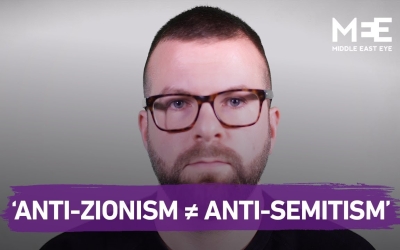
The difference between my prosecution here and in Britain is that I felt that my defence team there was speaking in front of an independent judge who did not yield to pressure and issued his decisions with his own convictions.
What do you think about accusations of antisemitism levied against anti-Zionists?
We are in a new phase in which it is prohibited to criticise Zionism, in the sense that they want to make anti-Zionism synonymous with antisemitism. All those who criticize Zionism now will be subject to the measures that were taken against those accused of antisemitism.
Israel does not occupy a people only, but it occupies international legitimacy, and this is its outlet to liquidate the Palestinian cause.
In the future, such actions will not help the Zionist project and its leadership. This is a red flag for every sane Jew in the world, because the Zionist project, by using this tactic, takes all the Jewish people in the world as hostage and conflates them all with these (Israel’s) practices. We know that large numbers of Jews in the United States are against the Zionist project.
We are now going through a pivotal stage in which they try to deal with events based on one vision with the slogan "you must serve the Zionist project”.
Can you comment on the "deal of the century"?
In the clauses of the "deal of the century", there is language about Jerusalem and the Al-Aqsa Mosque, saying that the doors of the mosque will be open for everyone who wants to worship, whether they are Muslim or non-Muslim. This text did not come out of nowhere.
Those who seek to build a (Jewish) temple on the ruins of the Al-Aqsa Mosque are not only those who uphold the Zionist project and its military arm, but also those known as the "New Zionists" who control the course of affairs in the United States. They are concerned, like the Israeli occupation, with building a temple at the expense of the Al-Aqsa Mosque for religious motives.
They believe that building a structure on the ruins of Al-Aqsa will cause a biblical war, so they rush to build it, and the deal of the century is indicative of their dreams and their political and biblical ambitions.
In short, the "deal of the century" is not only addressing the Palestinian cause, but rather seeks to support the existence of the Zionist project here and legitimise it, while ensuring its extension to more than one Arab and Muslim country.
What are your thoughts on the normalisation of relations of a number of Arab and Muslim countries with Israel?
The issue of opening the door to trade or airspace access and travel with Arab and Muslim countries is an attempt to create an incubator that would give legitimacy to the occupation and the Zionist project.
I assure you, however, that this legitimacy does not go beyond the person who carries it out at the level of his position, because the conscience of Arab and Muslim people is still alive, rejecting everything that is happening now, whether they remain silent or express their opinion and endure because of it harm and imprisonment.
The masses are the law and the foundation, and their rejection of everything that is happening now shows that the "deal of the century" was born dead and will not go beyond that, no matter how much it is applauded by some.
So long as there is a free Arab and Palestinian people, these rulers will not succeed in passing the deal with this popular support (for the Palestinian cause) on the ground.
It is very painful when the occupation boasts that it has sole sovereignty over the Al-Aqsa Mosque, and to affirm that imprisons, beats and injures those who enter Al-Aqsa, men and women - only then to find that some reward this behaviour and give it legitimacy through language of normalisation, trade and tourism deals.
This undoubtedly gives legitimacy to the Israeli aggression at Al-Aqsa Mosque, Jerusalem and the West Bank and the tightening of the siege on Gaza.
Middle East Eye delivers independent and unrivalled coverage and analysis of the Middle East, North Africa and beyond. To learn more about republishing this content and the associated fees, please fill out this form. More about MEE can be found here.


